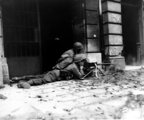10
10
0
Edited 2 y ago
Posted 2 y ago
Responses: 3
https://en.wikipedia.org/wiki/Battle_of_Aachen
The Battle of Aachen was a combat action of World War II, fought by American and German forces in and around Aachen, Germany, between 2–21 October 1944. The city had been incorporated into the Siegfried Line, the main defensive network on Germany's western border; the Allies had hoped to capture it quickly and advance into the industrialized Ruhr Basin. Although most of Aachen's civilian population was evacuated before the battle began, much of the city was destroyed and both sides suffered heavy losses. It was one of the largest urban battles fought by U.S. forces in World War II, and the first city on German soil to be captured by the Allies. The battle ended with a German surrender, but their tenacious defense significantly disrupted Allied plans for the advance into Germany.[4]
The Battle of Aachen was a combat action of World War II, fought by American and German forces in and around Aachen, Germany, between 2–21 October 1944. The city had been incorporated into the Siegfried Line, the main defensive network on Germany's western border; the Allies had hoped to capture it quickly and advance into the industrialized Ruhr Basin. Although most of Aachen's civilian population was evacuated before the battle began, much of the city was destroyed and both sides suffered heavy losses. It was one of the largest urban battles fought by U.S. forces in World War II, and the first city on German soil to be captured by the Allies. The battle ended with a German surrender, but their tenacious defense significantly disrupted Allied plans for the advance into Germany.[4]
(4)
(0)
It's interesting how the we used flamethrowers sparingly in the European theater, unlike in the Pacific. I know there are those who say it was because of racism towards the Japanese, but I think it was more a much more open terrain of Europe allowed for more maneuver around the strongpoints.
(2)
(0)
Read This Next



 Europe
Europe Military History
Military History WWII World War Two
WWII World War Two



